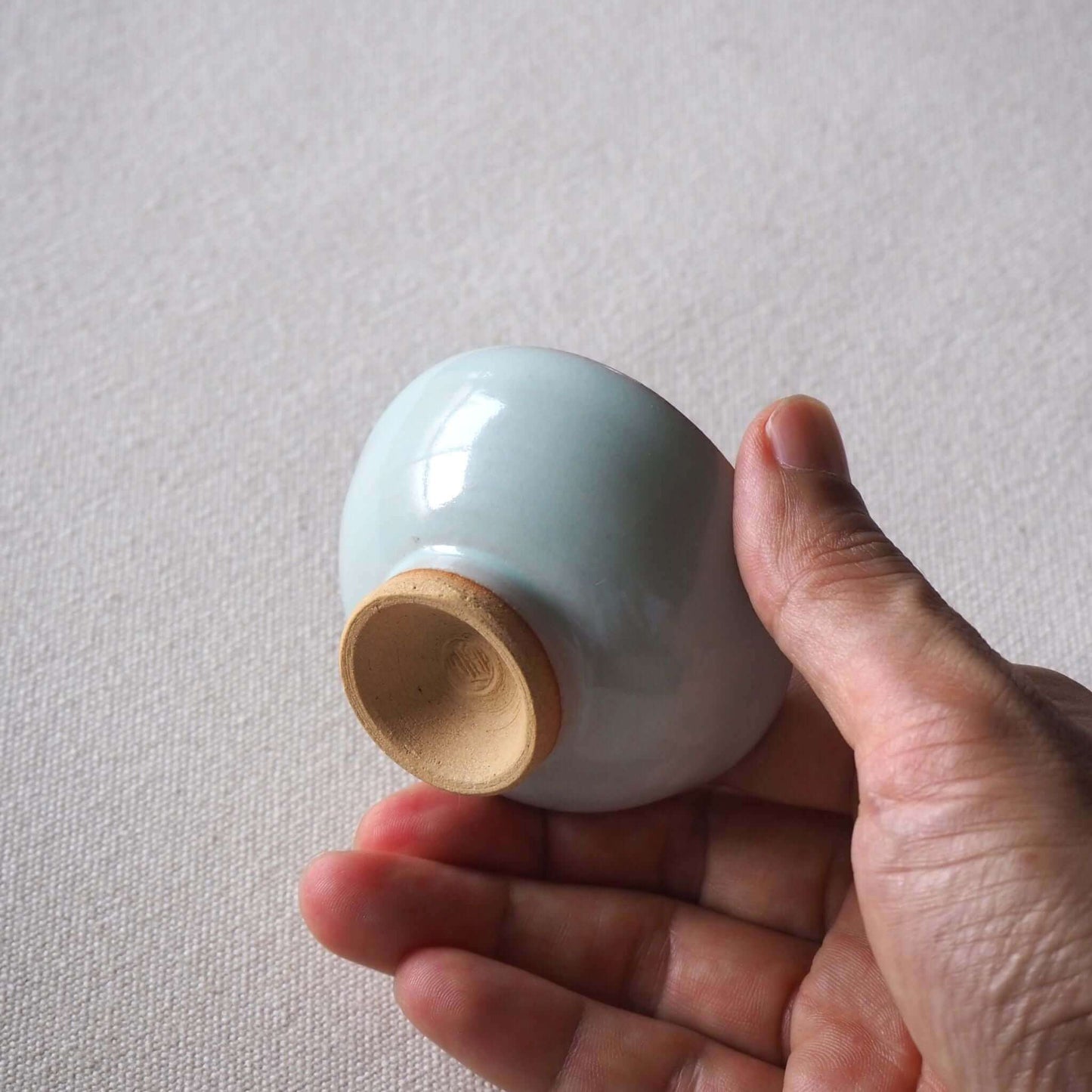煎茶 中国茶 台湾茶向け 日本の急須/茶壺専門店 東山堂
Kyoware Sekiun kiln blue glaze tea cup B (50ml)
Kyoware Sekiun kiln blue glaze tea cup B (50ml)
This is a blue glaze tea cup made by Sekiun kiln.
The beautiful sky blue color is reminiscent of the celadon porcelain of the Ru kiln, which was known as the kiln that produced celadon porcelain for the imperial court during the Northern Song Dynasty in China.
There are some areas where the glaze has a light purple color, giving the entire vessel a soft and elegant atmosphere.
This tea cup is made using a potter's wheel, scraping the surface and shaping it. The scratch marks on the bottom are beautiful. Only the bottom is unglazed, and the feel of the clay feels good in your hand.
This tea cup is characterized by its round shape and beautiful sky blue color. A handmade bowl that shows off the color of the tea.
Potter: Sekiun Kiln (Kyoto)
Molding: Potter's wheel molding
Type: Pottery
Size: Diameter approx. 7.5cm, bottom diameter approx. 3cm, height approx. 3.5cm
Capacity: Full water 50ml Practical 30ml
Weight: 40-50g
Packing: Paper box
Note: Because it is handmade, each piece will vary slightly.
<Kyoto ware>
Kyo-yaki is ceramics made in Kyoto City. After the Edo period (around 1800 A.D.), many tea utensils for matcha and sencha were made as tea ceremonies became popular. Against the backdrop of Kyoto's high culture, it developed with the support of temples, shrines, nobles, and merchants.
They specialize in vividly colored ceramics such as dyed, red-colored, and gold-colored paintings, as well as finely crafted ceramics. This is ceramics with a high aesthetic sense and modeling technology that incorporates various techniques and styles.
Couldn't load pickup availability
Out of stock
View full details








FAQ
Which type of of tea can I brew with the teapot?
It can be used for any type of tea. However, unglazed pottery is more likely to absorb the flavor of the tea leaves. By using different tea utensils for each type of tea, you can enjoy the flavor of the tea to the fullest.
For example, in the case of Japanese tea, sencha, fukamushicha, genmaicha, and gyokuro are all in the same family, but since hojicha has a strong roasted aroma, we recommend using a different tea utensil.
However, glazed pottery or porcelain tea utensils do not absorb the flavor of the tea leaves, so they are suitable for brewing various types of tea.
How do you wash a teapot?
Please wash the teapot with water, without using detergent. Ceramic teapots easily absorb detergent ingredients, which can affect the flavor of the tea.
Tea leaves remaining in the teapot are the main cause of tea stains. After brewing tea, we recommend removing the tea leaves once they have cooled and rinsing them with water.
Moisture remaining in the teapot can cause mold. Turning the teapot upside down will help it dry faster.
We do not recommend washing it in the dishwasher. Please wash by hand.
Can I remove tea stains from a teapot?
Here's how to remove tea stains.
1. In a bowl or pot, mix 24g of baking soda with 1 liter of water at 30-40°C.
*Do not use aluminum or Teflon-coated pots as they will react with baking soda.
2. Leave the teapot in the water mentioned in step 1 for 30-60 minutes.
3. Wipe off the tea stains with a soft sponge or cotton swab. Do not use hard sponges or brushes.
4. Rinse the teapot with water.
5. Thoroughly dry the teapot.
*Baking soda water may irritate your hands, so wear rubber gloves.
Can I return the product?
We do not accept returns unless the product is damaged when the package arrives.
Each tea utensil is slightly different and may have slight distortions or scratches. Please check the images posted on our online shop in advance.
If you have any questions about the detailed condition of the product, please feel free to contact us. We can send you additional images and videos of the product.
Do you ship internationally?
We can ship to the following countries:
China, Hong Kong, Macau, Taiwan, South Korea, Singapore, Malaysia, Indonesia, Thailand, Vietnam, Philippines
Are the goods antiques or second-hand goods?
All the products in the shop are new. We sell products produced by potters and kilns in Japan.









